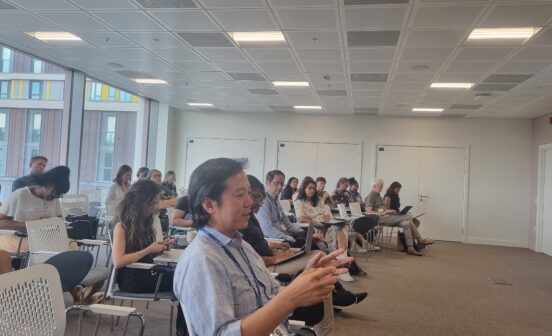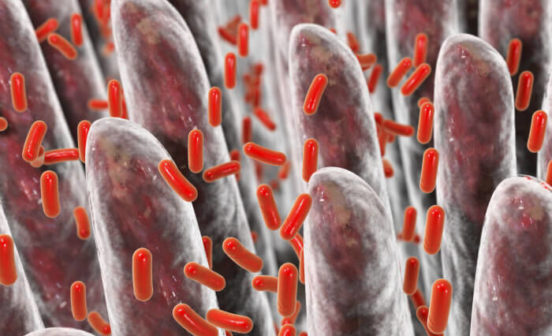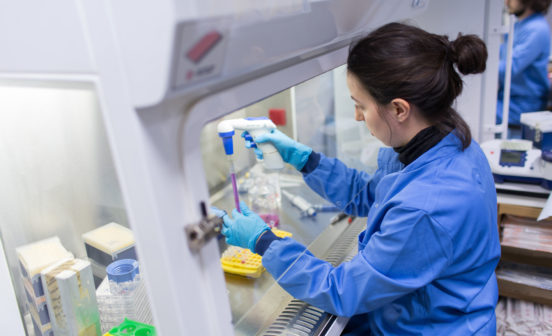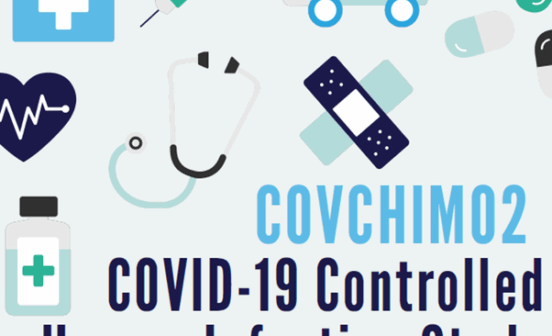PartnershipTherapeutic Faecal microbiota transplantation: effective treatment of gut infections

Imperial BRC researchers have identified mechanisms underlying the excellent efficacy of faecal microbiota transplantation (FMT) in treating antibiotic-resistant Clostridioides difficile infection (CDI) in the gut.
Clostridioides difficile is a form of bacteria that infects the human colon, usually following treatment with antibiotics, and can lead to diarrhoea, intestinal perforation, multiorgan failure, and death. Antibiotic treatment can diminish and wipe-out the protective gut microbes that usually stop us getting gastrointestinal infections, allowing C. difficile to infect and inflame the large bowel. With rising incidence of recurrent CDI, there is an immediate need for alternatives to antibiotic treatment for gut infections.
One key therapeutic approach of interest has been to re-populate the infected gut with protective microorganisms. This has been one of the drivers giving rise to FMT treatment, where microbes from a faecal sample of healthy, screened individuals are delivered into guts of infected patients. NIHR Imperial BRC researchers Dr Benjamin Mullish and Dr Julie McDonald outlined the history and progress of the procedure in a recent blog post, highlighting Imperial’s strong expertise in the area.

In 2014, Imperial established an FMT service at St Mary’s Hospital (one of the first in the country at the time), with support from the NIHR Imperial BRC and Imperial Health Charity. Remarkably, a number of patients with severe antibiotic-resistant CDI infections – who had often had multiple long hospital admissions, and who were experiencing a very impaired quality of life – returned to improved health and normal wellbeing after a single dose of FMT. Recently, the first-ever UK FMT Guidelines were published (which Imperial FMT clinicians significantly contributed to), providing evidence-based advice of best clinical FMT practice. With new support from the BRC, Imperial researchers are also beginning to research whether FMT may be useful in the treatment of conditions other than CDI. One major area of interest is whether FMT can help people who have guts colonised with microbes that are resistant to multiple antibiotics; this work is at an early stage, but there are already some promising data suggesting that FMT may be able to successfully remove (‘decolonise’) such microbes from the gut of affected patients.
Furthermore, ongoing research by Dr Julie McDonald and Prof Julian Marchesi is focused around better understanding the precise molecular mechanisms underlying FMT’s efficacy, with the aim of using this knowledge to formulate novel, targeted therapy for treating CDI. Using multi-omic techniques, the group recently identified that valerate – a short-chain fatty acid produced by healthy gut microbial metabolism – was directly responsible for limiting growth of C. difficile. Gut valerate levels were virtually undetectable in patients with CDI, and levels did not recover after stopping antibiotic treatment alone. The levels could only be restored with FMT, which in turn reduced gut C. difficile levels by up to 94%. Intervention experiments assessing the effects of valerate administration produced comparable results, thereby identifying valerate as a potential target for targeted therapy against CDI.
In a complementary study, the group demonstrated that FMT restored the balance of various bile acids in the gut of those with CDI, consequently influencing the ability of C. difficile to grow. Successful FMT was accompanied by a significant and sustained increase in FGF19 and a reduction in FGF21 in the serum of patients, as well as an association with weight gain. Together, these studies have helped provide deeper understanding of the mechanism of action of FMT, enabling tailoring of treatment.
This is an example of excellent collaboration between different BRC themes (Gut Health, Infection & AMR and Molecular Phenomics), where clinical, scientific and technological experts address a serious medical problem from multiple angles. With additional funding from the Medical Research Council and Imperial Health Charity, this research continues to improve therapies for this condition and beyond.
Image: Imperial Medicine Blog





